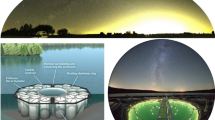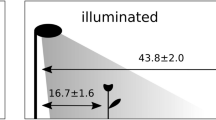Abstract
NATURAL mirage is due to the passage of rays of light through strata of air in which the refractive index is a function of the height of the ray above the ground. In these strata the air, though not homogenous, is isotropic, that is, its optical properties at every point are the same in all directions but vary from point to point. In natural mirage the non-homogeneous strata generally form horizontal layers, and in different conditions the air above or below the stratum may be the denser. The refractive index of a gas depend almost entirely on its density, and, hence, if the pressure is constant (which may be assumed for the thin mirage producing layers) light will travel faster as the height of the ray increases if the warm air is uppermost, and vice versa.
This is a preview of subscription content, access via your institution
Access options
Subscribe to this journal
Receive 51 print issues and online access
$199.00 per year
only $3.90 per issue
Buy this article
- Purchase on Springer Link
- Instant access to full article PDF
Prices may be subject to local taxes which are calculated during checkout
Similar content being viewed by others
Author information
Authors and Affiliations
Rights and permissions
About this article
Cite this article
MALLOCK, A. Mirage: Natural and Artificial. Nature 122, 94–95 (1928). https://doi.org/10.1038/122094a0
Issue Date:
DOI: https://doi.org/10.1038/122094a0
Comments
By submitting a comment you agree to abide by our Terms and Community Guidelines. If you find something abusive or that does not comply with our terms or guidelines please flag it as inappropriate.



